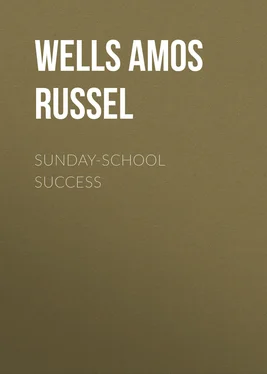Amos Wells - Sunday-School Success
Здесь есть возможность читать онлайн «Amos Wells - Sunday-School Success» — ознакомительный отрывок электронной книги совершенно бесплатно, а после прочтения отрывка купить полную версию. В некоторых случаях можно слушать аудио, скачать через торрент в формате fb2 и присутствует краткое содержание. Жанр: foreign_prose, foreign_religion, Философия, foreign_psychology, foreign_antique, на английском языке. Описание произведения, (предисловие) а так же отзывы посетителей доступны на портале библиотеки ЛибКат.
- Название:Sunday-School Success
- Автор:
- Жанр:
- Год:неизвестен
- ISBN:нет данных
- Рейтинг книги:5 / 5. Голосов: 1
-
Избранное:Добавить в избранное
- Отзывы:
-
Ваша оценка:
- 100
- 1
- 2
- 3
- 4
- 5
Sunday-School Success: краткое содержание, описание и аннотация
Предлагаем к чтению аннотацию, описание, краткое содержание или предисловие (зависит от того, что написал сам автор книги «Sunday-School Success»). Если вы не нашли необходимую информацию о книге — напишите в комментариях, мы постараемся отыскать её.
Sunday-School Success — читать онлайн ознакомительный отрывок
Ниже представлен текст книги, разбитый по страницам. Система сохранения места последней прочитанной страницы, позволяет с удобством читать онлайн бесплатно книгу «Sunday-School Success», без необходимости каждый раз заново искать на чём Вы остановились. Поставьте закладку, и сможете в любой момент перейти на страницу, на которой закончили чтение.
Интервал:
Закладка:
Chapter XI
A Good Question
If I were asked to name the chief fault of the average teacher, I should say, "Asking questions that can be answered by 'Yes' and 'No.'" Among my acquaintances was once a teacher in a secular school whose method of questioning was invariably this. He would have before him the statements of the text-book, copied out with painstaking care, and would develop the subject thus: "Is it true or is it not true, Mr. A–, that"—and here would follow the statement or definition of the text-book. The ambiguous answer, "Yes," was amply satisfactory. Unfortunately, when such teachers gain a foothold in the Sunday-school, they are not so easily dismissed as from secular establishments.
Now, a good question merely furnishes the starting-point, and pushes the scholar out along the course toward some goal of truth; but in a question that can be answered by "Yes" or "No" the teacher himself ambles amiably up the track, and condescendingly allows the scholar's monosyllable to pat him on the head after he himself has reached the goal. A question that can be answered by "Yes" or "No" merely formulates the truth as it exists in the teacher's mind, and invites the scholar's assent to it; a good question, on the contrary, provokes the scholar to formulate truth for himself.
Now, it is much easier to express what we see to be true than to get any one else to express original thought. There is also, to the unwise, more glory in laying down principles to which others must agree than in getting others to lay down principles to which we must agree. It will always be true, therefore, that the lazy and the pompous will have no aim beyond educing monosyllabic answers. Most teachers, however, are earnestly desirous of the best, but do not know how to frame wise questions. What must be said to them?
First, that they must not go to school before their scholars. Expert questioning is not learned in the class-room, but in the study. A lead-pencil is the best teacher. A sheet of paper is the best drill-ground. As I have urged before: Let the Sunday-school worker who aspires to the high praise of a good questioner sit down persistently, after studying the lesson, and write out a set of questions. Nay; on each point, so far as he has time, let him write several questions, criticise them, fancy what kind of answer each will be likely to elicit from the scholar, and choose what appears the best question. Try it on the class, and learn valuable lessons from the result.
This method, laborious as it is, must be kept up until skilful questioning has become instinctive. That there may be hope of this happy result, by the way, the written questions must never be used in the class,—only the memory of them, and the drill the preparation has given. It surely will happen, sooner or later, that the careful student of practical pedagogics will be able to get along without writing, merely formulating fit questions in his mind as he studies the lesson. After a time he may dispense even with this, and look simply after the points to be presented, trusting to extemporaneous question-making.
Not wholly, however. The best questioner in the world gets into ruts. The best forms of questions ever invented are worse than the worst if they are used with dull reiteration. No one can devote careful attention to the form of his questions without falling in love with some particular way of questioning; and this will not always be the best way, but will probably be the most original way. A form of question that is irreproachable the first time will be unendurable used six times in succession. It is necessary, then, even for the trained questioner, to revert now and then to his old lead-pencil drill, in order to study variety.
But how may the uninitiated know a good question when they see it, or make it? As said already, it must not be such that a lazy monosyllable may answer it. As said already, too, if one is in doubt, he has but to try it on the class, and note results. But further. A good question will be likely to have something piquant about it, if the subject admits. For instance, "James was killed, Peter was freed; why was that?" is better than saying, "How do you account for the fact that while the apostle James was beheaded, the apostle Peter was delivered from the hands of his persecutors?"
Furthermore, the difference between a poor question and a good one may often be a mere matter of length. "Why did the Christians at Antioch keep the inferior leaders for work in the city, but send away the most prominent men in their church to labor as missionaries?" That is abominable; it should be, "Why did the Antioch Christians send away their best men?"
A good question will contain as much as possible of the personal element. "What do you understand by the phrase 'remission of sins'?" is much better than "What is the significance of the phrase 'remission of sins'?" Because the personal question puts the expected answer in a more modest light, the answer will be more unconstrained and full.
And, by the way, there are few forms of questions more zealously to be avoided than the form I have just used, "What do you understand by—?" It is the unfailing resource of the poor questioner. A verse will be read, a phrase quoted, a doctrine or a principle named, and then will follow, as the night the day, the tiresome old formula, "What do you understand by this, Miss A–?" One would be quite safe in declaring, at any particular instant during common Sunday-school hours, that one-fourth of the Sunday-school teachers of the world were repeating, with united breath, that Methuselah of a query, "What do you understand by this?"
Again, a good question must be swift. It must come so quickly that there will be no time to get out of the way. Some questions that, if written out, would not be bad, are prolonged in the utterance of over-deliberate teachers like foggy illustrations of the law of perspective. Good questions leap. You feel their buoyancy as you read them or hear them. It is like the huntsman springing into the saddle and shouting, "Come on!" No one with an atom of thoughtfulness is dull to the exhilaration of spirited questions. They have inspired all the wise thinking of the world.
And, finally, good questions should be absolutely clear. There is one thing in the world that must always be faultlessly perspicuous and distinct, and that is a marching order in time of battle. Now, questions are the marching orders of our scholars' brain regiments, in a battle of infinite moment. Let them ring clearly as ever bugle-call was sounded. Questions mumbled, hesitant, caught up and patched over, confused and slovenly,—what wonder if these get slow and mumbled answers? A question clearly put, not only proves that the questioner has clear ideas, but it wondrously clarifies the ideas of the answerer.
Good questions, then, are thought-compelling, varied, short, personal, piquant, unhackneyed, brisk, and clear. Do I ask too much? Nothing that all may not acquire, if but a tithe of the zeal and labor claimed by the trivialities of a few years are spent upon these issues of eternity. Let every teacher consider what characteristics of a good questioner he may add to his pedagogical outfit.
Chapter XII
Inspiring Questions
I use this title advisedly, because I believe that it requires more genuine inspiration to lead the average scholar to ask questions than to perform any other part of the teacher's difficult task. How easy to ask our own questions, to put in our own answers in order to draw them out again, were that all of it! But to transform the passive into the active, the auditor into the investigator, the questioned into the questioner, that is the goal of the true teacher's endeavor.
Shall we count a recitation successful when the teacher has been earnest and zealous in his inquisition, the scholars ready and full in their responses? A single question, borne, it may be, on a voice so timid that it is scarcely audible in the buzzing room, yet sprung from some young heart just moved with the sudden desire of truth, is worth all the rest.
Читать дальшеИнтервал:
Закладка:
Похожие книги на «Sunday-School Success»
Представляем Вашему вниманию похожие книги на «Sunday-School Success» списком для выбора. Мы отобрали схожую по названию и смыслу литературу в надежде предоставить читателям больше вариантов отыскать новые, интересные, ещё непрочитанные произведения.
Обсуждение, отзывы о книге «Sunday-School Success» и просто собственные мнения читателей. Оставьте ваши комментарии, напишите, что Вы думаете о произведении, его смысле или главных героях. Укажите что конкретно понравилось, а что нет, и почему Вы так считаете.












